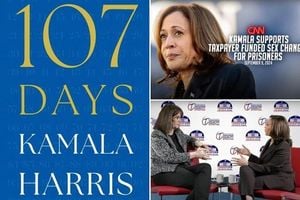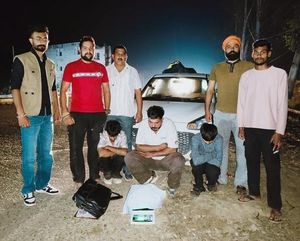As the dust settles from the 2024 election, the political gaze is already shifting toward 2028, and nowhere is that more apparent than in New Hampshire and Nevada. Recent developments in both states have set the stage for a fierce contest—not just among presidential hopefuls, but between states themselves vying for influence in the next White House race.
According to a poll conducted online in New Hampshire on August 26-27, 2025, Vice President JD Vance has emerged as the clear frontrunner in a hypothetical 2028 Republican primary. The survey, which carries a margin of error of plus or minus 2.3 percentage points, found Vance commanding a dominant 56 percent of GOP support. No other Republican contender came close: Florida Governor Ron DeSantis trailed far behind with just 8 percent, followed by a list of familiar names including Marco Rubio, Tulsi Gabbard, Liz Cheney, Nikki Haley, Vivek Ramaswamy, Robert F. Kennedy Jr., and Senator Ted Cruz. Notably, Nikki Haley—who won 43 percent of the primary vote in New Hampshire in 2024—failed to break double digits in this early poll.
On the Democratic side, the picture is less clear-cut. California Governor Gavin Newsom and former Transportation Secretary Pete Buttigieg are locked in a dead heat, each drawing 23 percent support from likely Democratic primary voters. Illinois Governor JB Pritzker follows with 9 percent, while Representative Alexandria Ocasio-Cortez of New York claims 7 percent. Former Vice President Kamala Harris, who narrowly won New Hampshire in 2024, finds herself in fifth place with only 6 percent support. Other Democratic names in the mix include Senators Cory Booker, Bernie Sanders (who previously won the state's Democratic primary twice but is not expected to run again), Amy Klobuchar, and Governors Josh Shapiro and Gretchen Whitmer.
Nearly all of the leading Democratic contenders have made appearances in New Hampshire over the past year, either headlining party fundraisers or campaigning for local candidates—an early sign of presidential ambitions and a nod to New Hampshire's historical role as the first-in-the-nation primary state. Buttigieg, who finished second in New Hampshire's 2020 Democratic primary, still enjoys a loyal following, while Newsom's profile has risen among activists, especially as he has taken on the Trump administration over redistricting issues. Meanwhile, big-name Republicans have largely steered clear of New Hampshire since the 2024 election, with the notable exception of Representative Nancy Mace, who visited just before launching her gubernatorial campaign.
But as New Hampshire basks in its traditional spotlight, Nevada Democrats are mounting a determined campaign to leapfrog the Granite State and claim the coveted first slot in the 2028 presidential primary calendar. Their argument is straightforward: Nevada, with its diverse population and dynamic electorate, offers a more accurate reflection of the nation as a whole.
"Being first puts us on the map. It brings all the attention to Nevada," Nevada State Democratic Party Chairwoman Daniele Monroe-Moreno told the Las Vegas Review-Journal. The economic benefits, she argued, would be substantial—more investments, more jobs, and a boost from the influx of campaign dollars. For context, $16.8 million was spent on advertising in Nevada's 2024 congressional primaries alone, according to AdImpact. And while President Joe Biden spent just $1.8 million in Nevada by June 2024—nearly ten times less than in Pennsylvania—Democrats believe that an earlier primary would drive up spending and attention in the Silver State.
This isn't Nevada's first attempt to move up the calendar. The state made a similar pitch ahead of the 2024 election, but was ultimately passed over in favor of South Carolina, following President Biden's recommendation. The decision was intended to highlight the importance of Black voters, who played a pivotal role in Biden's 2020 primary victory. Nevada and New Hampshire ended up tied for second, with Michigan and Georgia rounding out the early contest states.
Now, with no incumbent president to influence the Democratic National Committee's decision and with increased Nevada representation in the party's leadership, state Democrats are optimistic about their chances. The formal pitch to reorder the early-state calendar is expected to play out over the coming months, with a final decision anticipated by spring 2026.
Why Nevada? State Democrats point to a litany of factors. Nevada is the third-most diverse state in the country, with a large working-class and non-college-educated population. More than 28 percent of registered voters are under the age of 35, according to the latest voter registration data. "Those are the exact voters Democrats need to talk to and persuade in a national campaign," said Travis Brock, the Nevada State Democratic Party’s treasurer and former executive director. Monroe-Moreno echoed the sentiment, describing Nevada as "a microcosm of who America is."
Beyond demographics, Nevada's electoral infrastructure is also a selling point. The state has automatic voter registration and in-person early voting, making participation easier and more accessible. Its two large media markets keep campaign costs down, and the mix of urban centers in Washoe and Clark counties with sprawling rural communities across 15 other counties offers candidates a unique proving ground.
There's also a strategic calculation at play. In 2024, working-class voters and voters of color shifted toward Donald Trump, with exit polls showing that voters without a college degree split 56 percent for Trump and 42 percent for then-Vice President Kamala Harris. Hilary Barrett, executive director of the Nevada State Democratic Party, wrote in a recent memo, "If we fail to rebuild that coalition, we won’t win back the White House." With its sizable working-class and union population, Nevada, Democrats argue, is the ideal launching pad for a campaign aimed at recapturing those voters.
Democrats also point to recent electoral successes in Nevada as evidence of the party's viability. Senator Catherine Cortez Masto eked out a narrow victory in 2022, and Senator Jacky Rosen won by less than two points in 2024. "We’re a state where Democrats can win with the right messaging and with the right candidate on the ballot. I think we’ve proven that," Monroe-Moreno said.
Meanwhile, Nevada Republicans appear content with their state's current status as "first in the West" in the GOP nominating process, which places Nevada third in the Republican lineup. Nevada GOP Chairman Michael McDonald told the Las Vegas Review-Journal that the state’s position continues to draw candidates and attention, while highlighting Nevada's growing importance in the national political landscape. "Everybody’s been coming to Nevada, everybody’s coming to Las Vegas. It sells well. It promotes well, and everybody wants to come here and be part of the energy when we have first of the West," McDonald said.
As the Democratic National Committee prepares to make its decision in 2026, the stakes are high—not just for New Hampshire and Nevada, but for the entire nominating process. Will tradition hold sway, or will the party opt for a more diverse and representative kickoff to the 2028 presidential race? For now, the only certainty is that the battle for first is well underway, and both states are making their cases with vigor.
With the 2028 campaign season already taking shape, all eyes are on the early states—where the race for the White House, and the race for influence, have only just begun.



